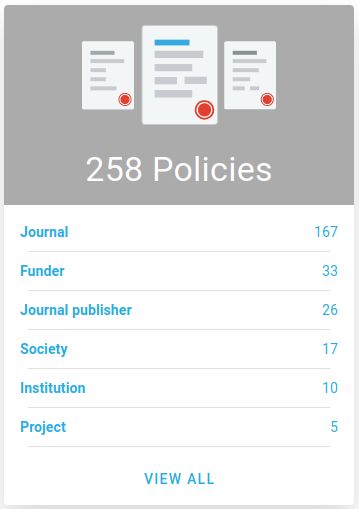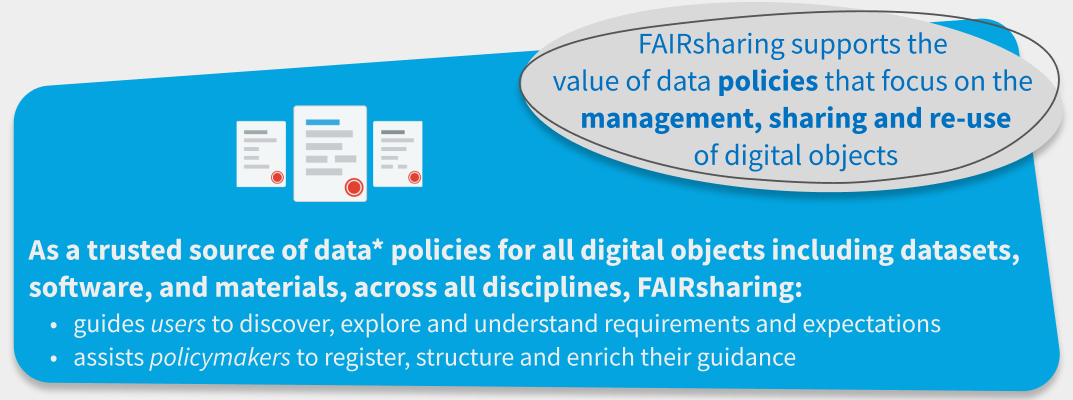FAIRsharing Community Champions and in-house FAIRsharing staff have completed a massive curation effort begun 6 months ago, resulting in the curation and checking of every policy-specific field across the entire FAIRsharing policy registry. This resulted in more than 2800 individual edits across over 250 policy records, and improves policy transparency and readability across the entire research policy landscape. Access to these fields is available via the records themselves, our FAIRsharing Assistant and our Advanced Search. In this post we celebrate the success and hard work of our Community Champions, and let you know some of the ways in which this curation will be used in future. Please read on to learn more about this huge achievement.
Background
In October 2023, FAIRsharing‘s Allyson Lister and the Digital Curation Centre‘s Joy Davidson ran a 2-hour professional development workshop to increase the skills of our Community Champions with regards to data policies. This workshop introduced Champions to the FAIRsFAIR data policy checklist, provided additional training on the FAIRsharing policy registry, and got Champions started on a new curation push to update the entirety of the FAIRsharing policy registry. The goal of the workshop was to bring everyone up to speed on the policy-specific metadata fields within FAIRsharing, which aims to improve discoverability and enable machine readability.
The FAIRsFAIR data policy checklist has been designed to help policymakers develop and review their research data related policies to determine whether or not they are FAIR-enabling (i.e., that they lead to the production and use of research data that are findable, accessible, interoperable and reusable). These fields had been added previously has part of an earlier collaboration between the DCC and FAIRsharing.

FAIRsharing is an informative and educational resource on interlinked standards, repositories and policies, across all disciplines. As a registry, it guides consumers to discover, select and use these resources with confidence, and producers to make their resource more discoverable, more widely adopted and cited. As a community-driven initiative, FAIRsharing promotes the value and use of these resources, which are key elements of the FAIR ecosystem. As a service, FAIRsharing provides descriptions of the interlinked standards, repositories and policies in machine readable format to power third party tools for data management, FAIR evaluations and assistance. As a working group in the RDA, FAIRsharing works with other initiatives to enrich the descriptions of these resources, to maximise their comparison and use, in a transparent manner.
In the context of policy development and discovery, FAIRsharing provides information on data preservation, management and sharing policies from international funding agencies, regulators, journals, and other organisations. FAIRsharing embeds the FAIRsFAIR data policy checklist elements into our metadata to improve the description of the policies in the registry and to ensure that the data policies themselves are more FAIR.
Policy Registry Curation
The 19 policy-specific metadata fields were fully reviewed and updated over the 6-month curation period. As a result, policies registered with FAIRsharing can now make the content of their policies more explicit and comparable by both humans and machines which will make monitoring the policy landscape more straightforward and efficient. Over the six months, eight of our Community Champions worked with our in-house team to review or annotate the more than 250 records in our policy registry.
- Kay Burrows: During her short-term contract with us, Kay performed the majority of the updates to this registry. You can read more about Kay Burrows’ experience working with our policies during this time in her recent blog post with us.
- Lindsey Anderson
- Yojana Gadiya
- Malin Sandström
- Kelly Cobey
- Joy Davidson
- Debora Drucker
- Adam Partridge
Together, they performed over 2800 edits to the policy registry during that time. There are many plans in the pipeline for improvements and new research using the policy registry, and this new influx of metadata allows us to realise these plans. For instance, a recent FAIR-IMPACT support action has called for awardees who will further enrich this registry. You can filter and browse this policy metadata via our FAIRsharing Assistant and our Advanced Search. The FAIR-IMPACT support action will also explore the extraction of the contributed policy data for use in continual monitoring of the policy landscape.
We are very thankful to all of our Champions, and especially to those who have contributed to this superlative effort within the policy registry.
For more information about how different stakeholders can make use of FAIRsharing, please see our educational pages.
